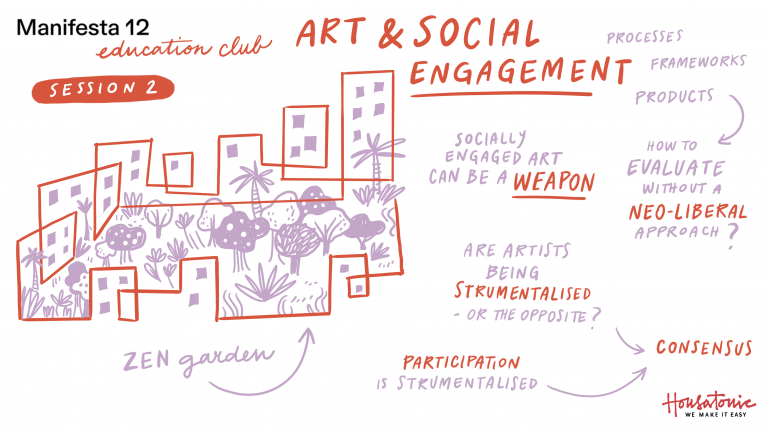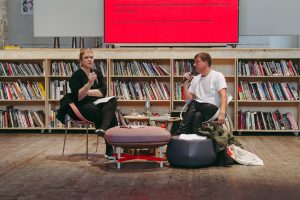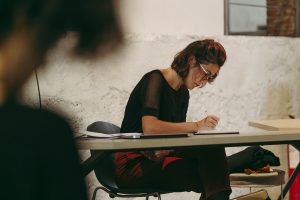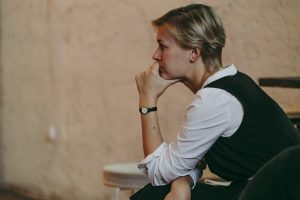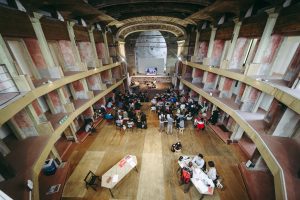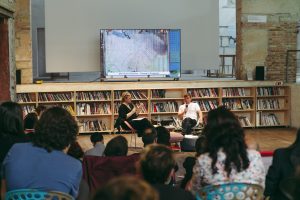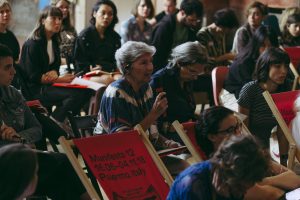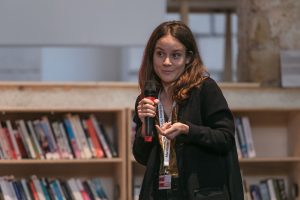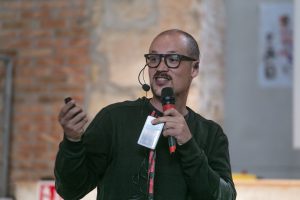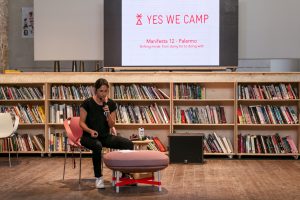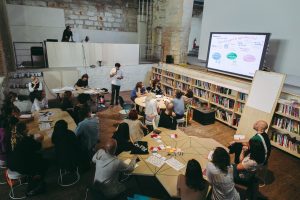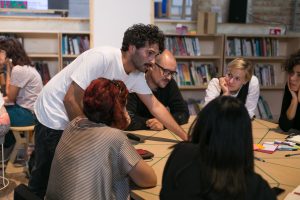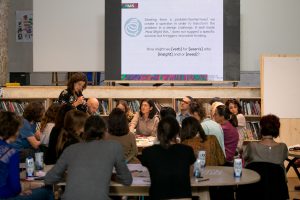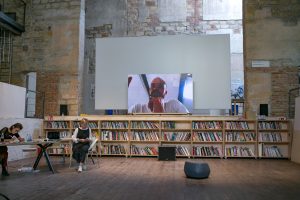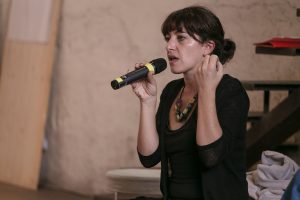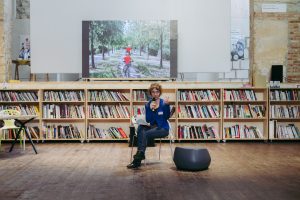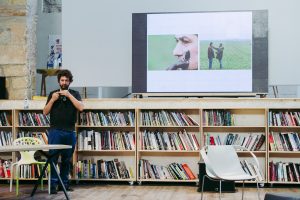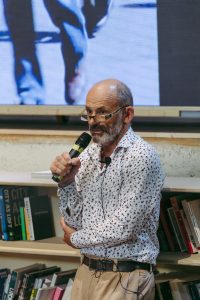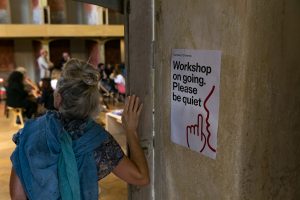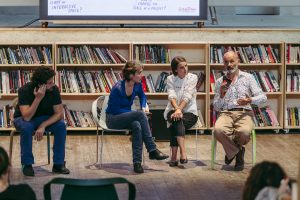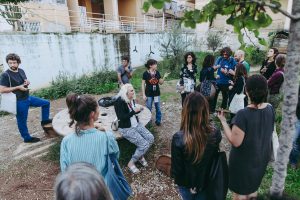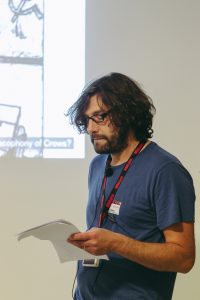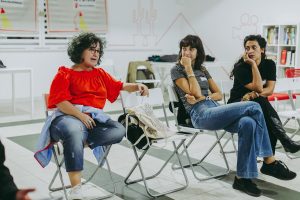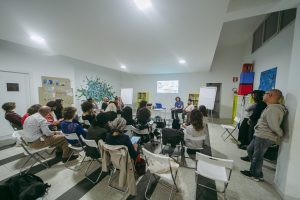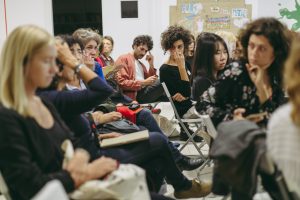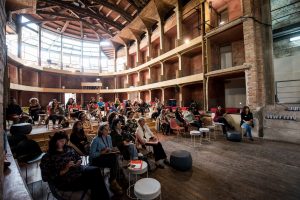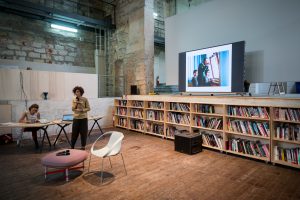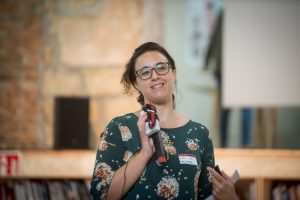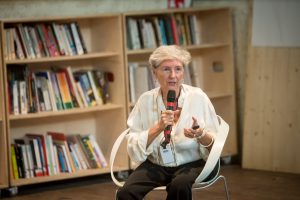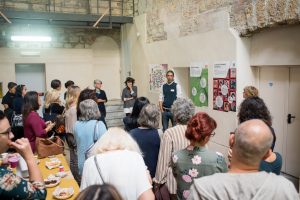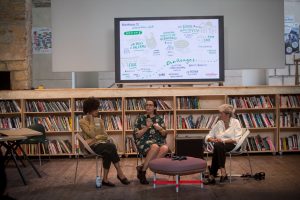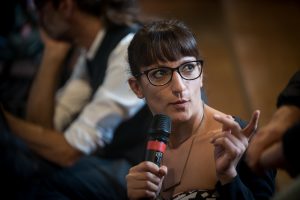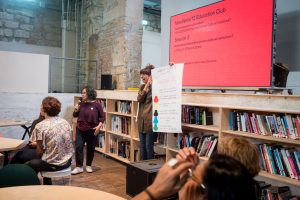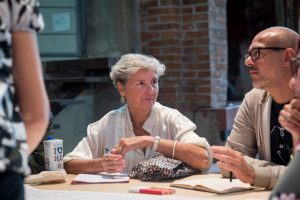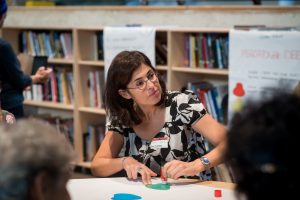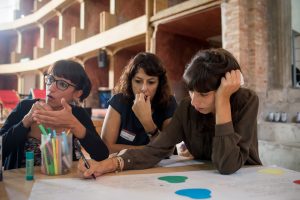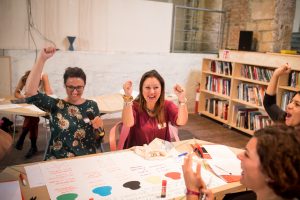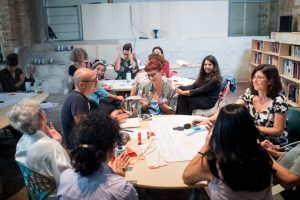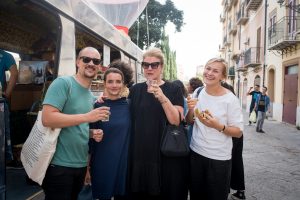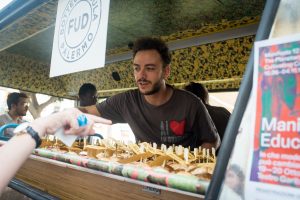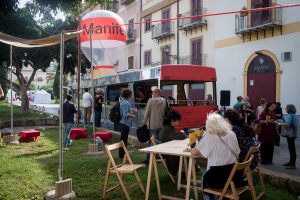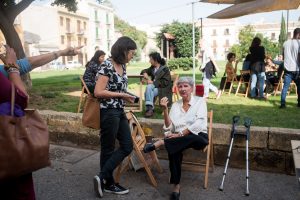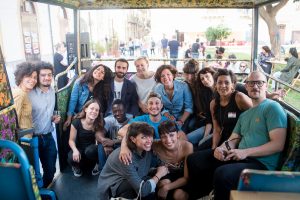Social change through culture
How Can Social Practice Change Cultural Initiatives?
19—20 October 2018
Palermo, Italy
Organised by the M12 Education Department, Manifesta 12 Education Club and its participants examine the grey zone between cultural mediation and social practice. In this grey zone, the two fields are barely distinguishable, overlapping, coexisting and using each other’s approaches.
It was in this grey zone that we found ourselves during the first days of research in Palermo. There we met most of our local collaborators and allies of the Education and Mediation Programme of the biennial. And it is this grey space which the Manifesta 12 Education Hub continues to investigate.
The temporary community of M12 Education Club breathe fresh air into existing discussions by fostering the circulation of new perspectives. The topics (issues) are revised by doubts and ongoing reflection, acceptance, and examination of failures – as well as non-verbal modes of communication and participation. This approach addresses recurring questions while avoiding generalisation, repetition, and fatigue.
The starting point of the sessions is the experience of building relationships, creating and engaging communities in the specific projects of Manifesta 12 in Palermo, as well as situating this new experience in relation to similar practices in Sicily, in other Italian cities, and in Marseille, another Mediterranean hub and the host city of Manifesta 13. Responding to the challenges of each particular case, the programme is divided into three thematic sessions to discuss certain aspects of participatory design, informal education in schools, and the confluence of cultural mediation and social practice. The real-time graphic facilitation during the sessions is done by Housatonic (Bologna, Italy).
Friday 19 October | 9.30 am
The Framework
Manifesta biennial: From an Art Exhibition towards a Potential Platform for Social Change
The question of Manifesta’s own identity – poised between an autonomous artistic biennial of symbolic expressions and a political and civic instrument of social change – was particularly urgent given the specific context of Palermo. Working in an urban environment like Palermo prompted Manifesta to invent a new research methodology – the urban study, and a new curatorial team model – creative mediators. The platform that Manifesta embodies is interdisciplinary, inclusive and participatory, it seeks to inspire people and entities creating transitory projects and change the way we perceive and mediate the conflicts of our times.
Speakers: Hedwig Fijen (Director, Manifesta) and Stefan Kalmár (Director, ICA, London)
Session 1 | Friday 19 October | 10.00 am
Shifting minds: from doing for to doing with
Participatory Design and Its Limits
Participatory practices, as a tool to co-design meaningful projects, have increasingly become a matter of interest – not only in the corporate world and politics, but in the agendas of cultural institutions as well. The majority of Manifesta 12 projects are based on participation. This session looks at the critical aspects and limits of participation embedded in the nature of the project, such as limitations of time and external intervention.
- What is the added value of the participatory design approach?
- What needs to be assured for a successful participatory project?
- How does participatory practice change in nomadic projects?
- Can there be a sustainable goal in short-term interventions?
Speakers: Carmelo Rodríguez (Enorme Studio, Madrid, Education Hub project, Manifesta 12 Education Programme), Perrine Détrie (Yes We Camp, Marseille), Rita Orlando (Open Design School, Fondazione Matera-Basilicata 2019, Matera)
Workshop moderated by Marco Berni (Prato, IT)
Session 2 | Friday 19 October | 2.30 pm
Are you doing cultural mediation or social work?
Caught Doing Social Work
Artists introduced socially-engaged practices into museums and cultural institutions some time ago. Certain institutions have identified social change as part of their mission and responsibility or even as a way of justifying their activities. At the same time, organisations conducting social work often look for new tools to inspire and encourage participation, which can be found in the practices of artists, musicians, performers, and other creatives. However, projects initiated by cultural institutions and social operators rarely meet or are placed on equal footing.
- Should social operators assess socially-engaged cultural projects and vice versa: Should cultural workers evaluate the artistic value of social projects?
- Should we draw a line between cultural mediation and social work?
- Is it the job (task) of cultural workers to respond to social issues?
- Is there an artistic quality level for social projects?
Speakers: Miguel Georgieff (Coloco, Paris-Montpellier, Manifesta 12 participant), Céline Rousseau (Le Gare Franche, Marseille), Jean-François Neplaz (Quartiers Créatifs, Marseille), Nico Angiuli (visual researcher, filmmaker and performer, Bari)
Workshop moderated by Stephen Pritchard (Newcastle, UK)
Session 3 | Saturday 20 October | 9.30 am
Does educational poverty concern cultural institutions?
Looking for a Place in School
The discussion about informal/arts education in Italian schools is over thirty years old. A new round of discussions appeared five years ago in relation to so-called educational poverty (povertà educativa). Culture plays a significant role in the fight against educational poverty, but the collaboration between formal education and cultural institutions is still a struggle for both parties. The starting point of this session is the experience of Manifesta 12 in creating a mediation tool kit with Palermo schools.
- In which forms should contemporary culture enter the schools? And what place should it seek to occupy?
- How do we reach an understanding between teachers and cultural mediators?
- What steps must be taken to legitimize contemporary cultural initiatives in schools?
Speakers: Valentina Mandalari (architect, Palermo, Mediation Kit ‘Un Sacco di Palermo’, Manifesta 12 Education Programme), Annamaria Cilento (Fondazione Sandretto Re Rebaudengo, Torino), Annabelle Arnaud (FRAC, Marseille), Marilena Verro (La scuola adotta la città – Assessorato alla Scuola, Palermo)
Workshop moderated by Gloria Vitaioli (Firenze, IT)
Session 3 is organised in collaboration with Cidi Palermo (Centro di iniziativa democratica degli insegnanti).

